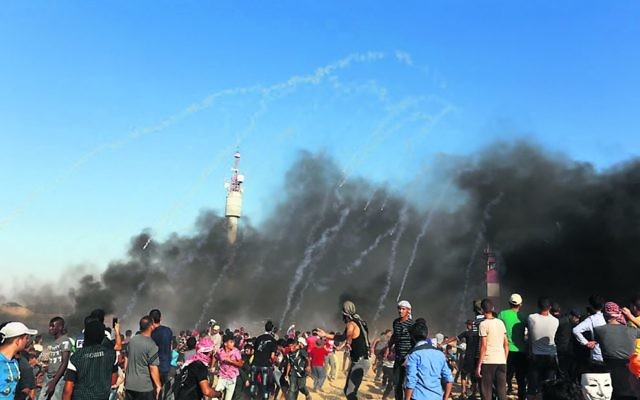Hamas and PA clash over Israel talks
Palestinian politics has been turned on its head, with Hamas deep in negotiations with Israel and the moderate Palestinian Authority furious about the process.

PALESTINIAN politics has been turned on its head, with Hamas deep in negotiations with Israel and the moderate Palestinian Authority furious about the process.
Hamas leaders indicated this week that they are close to signing a deal for a long-terms ceasefire with Israel, which will be the outcome of indirect negotiations.
The deal aims at bringing an end to almost five months of weekly riots on the Israel-Gaza border, and ending rocket and mortar fire, which has been intense on several days in recent months.
The Palestinian establishment in Ramallah, Israel’s usual partner for talks, says that Hamas mustn’t go through with the deal.
“If Hamas decides to conclude a unilateral truce agreement with Israel, it will be contributing to the destruction of the Palestinian national project,” said Saeb Erekat, a close associate of Mahmoud Abbas, the Palestinian President.
Abbas and his Palestinian Authority object to Hamas, and several smaller factions that are involved in the negotiations, reaching their own ceasefire agreement with Israel. Instead, Abbas wants to be in charge of all discussions with Israel.
Abbas also wants Hamas to come good on an agreement for Palestinian reconciliation, which would put his PA in charge of Gaza instead of Hamas.
He fears that if Hamas reaches its one agreement with Israel, it will cement the organisation’s control over Gaza.
Israel’s Defence Minister Avigdor Lieberman confirmed on Tuesday that he is seeing a “dramatic decrease” in violence from Gaza, but refused to confirm that it is related to ceasefire talks. Instead, he said that the key to calm would be economic, with Gaza’ to get economic benefits when the border is quiet.
Despite the talks, Hamas encouraged demonstrators to take part in the weekly border riots last Friday — the same day as a non-fatal stabbing attack against a policemen in Jerusalem.
Some demonstrators in Gaza sabotaged the border fence and threw Molotov cocktails at soldiers and several Gazans briefly infiltrated Israel. Two Palestinians were reported dead.
Israel has defended its actions on the Gaza border during the clashes of recent months, but on Tuesday raised question marks regarding two incidents. The Military Advocate General, Sharon Afek, ordered investigations of two incidents in which Palestinians were shot by IDF troops by the border fence.
One was the death of Abed al Nabi on March 30; the other was the death of Otman Hales on July 13. The IDF said it is launching the investigations “following a suspicion that the shooting in these incidents was not in accordance with standard operating procedures”.
In other related news, United Nations Secretary-General Antonio Guterres has released a report suggesting new steps for “the protection of the Palestinian population” in both Gaza and the West Bank. He drew up the report in response to a June UN resolution criticising Israel for its conduct on the Gaza border.
He made several suggestions including increased UN presence on the ground, and a new force on the ground to protect Palestinians.
Israel’s ambassador to the UN, Danny Danon, was incredulous, saying that “the only protection the Palestinian people need is from their own leadership.”
NATHAN JEFFAY

comments